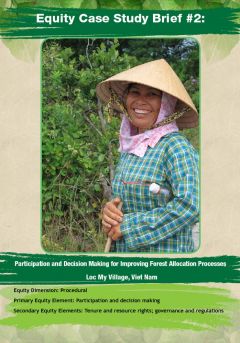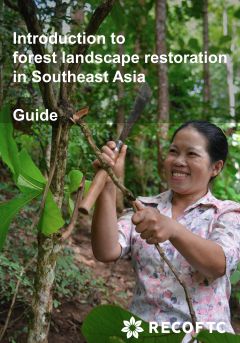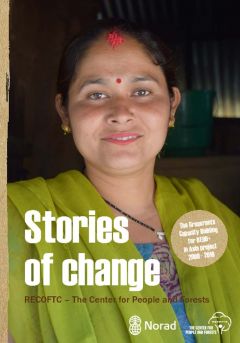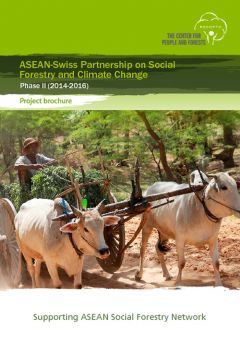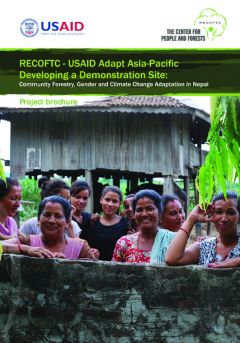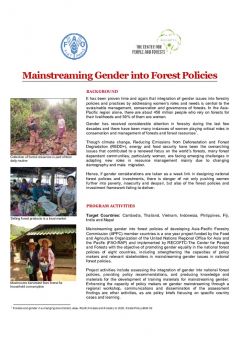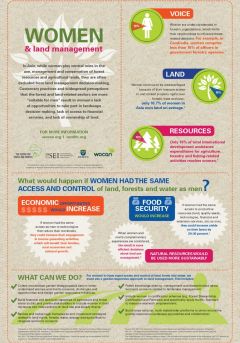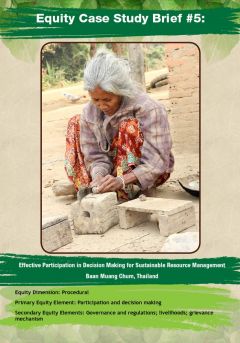Introduction to forest landscape restoration
This guide is for forestry practitioners from local communities, governments, the private sector, civil society and academia in Southeast Asia. It explains the fundamentals of forest landscape restoration (FLR) and serves as a starting point for future exploration and design of FLR initiatives.
The Value of Cultural Theory for Participatory Processes in Natural Resource Management
While participation is seen as an important part of sustainable natural resource management, it is not always successful – a number of studies to date indicate conflicting values and power inequalities can significantly undermine participatory processes. A new paper in the Journal of Forest Policy and Economics examines another source of conflict: differing views of reality and underlying cultural biases.
Optimizing the Role of Community Forestry to Achieve the Sustainable Development Goals through the ASEAN Cooperation on Food, Agriculture and Forestry
Community Forestry (CF) can play a fundamental role in achieving nearly all the SDGs through its focus on improving livelihoods, strengthening local governanceand, halting deforestation and improving forest quality.Various experiences of CF in the region have demonstrated that the allocation of forest management rights and responsibilities to local people is an effective strategy for sustainable forest management and provides potential contribution to improved outcomes for forest cover and condition and local livelihoods.
Stories of Change (2009 - 2016)
Since 2009 RECOFTC through the Grassroots for Capacity Building for REDD+ in Asia project have been working to develop capacities of local partners in five countries (Indonesia, Lao PDR, Myanmar, Nepal and Viet Nam) to facilitate awareness raising on and initiatives to deal with climate change and REDD+.
Understanding Women's Participation in Forestry in Nepal
This brief discusses how gender perspectives are being integrated in Nepal's forest policies, laws and regulations in terms of women's representation, participation, access and decision-making in forest use and management. The brief also highlights the key challenges that prevail and outlines recommendations to promote gender mainstreaming further in forestry.
ASEAN-Swiss Partnership on Social Forestry and Climate Change Phase II (2014-2016)
Since 2009, the Government of Switzerland and RECOFTC have partnered with ASEAN through the Swiss Agency for Development and Cooperation (SDC)’s support to the ASEAN Social Forestry Network (ASFN) and the ASEAN-Swiss Partnership on Social Forestry and Climate Change (ASFCC). This is a brochure describing the RECOFTC activities under the ASFCC Phase II (2014-2016).
RECOFTC - USAID Adapt Asia-Pacific Developing a Demonstration Site: Community Forestry, Gender and Climate Change Adaptation in Nepal
RECOFTC - The Center for People and Forests with support from USAID Adapt Asia-Pacific are working to empower local women in the village of Bishnupur, Nepal to take climate action into their own hands and protect their community's vital forestry resources.
Mainstreaming Gender into Forest Policies
It has been proven time and again that integrating gender issues into forestry policies and practices by addressing women’s roles and needs is central to the sustainable management, conservation and governance of forests. In the Asia-Pacific region alone, there are about 450 million people who rely on forests for their livelihoods and 50% of them are women.
Women and Land Management
In Asia, while women play central roles in the use, management and conservation of forest resources and agricultural lands, they are often excluded from land management decision-making. Customary practices and widespread perceptions that the forest and land-related sectors are more “suitable for men” result in women’s lack of opportunities to take part in landscape decision-making, lack of access to financial services, and lack of ownership of land.
Equity Case Study Brief #5: Effective Participation in Decision Making for Sustainable Resource Management - Baan Muang Chum, Thailand
In this case, equity issues were brought about by the absence of participation mechanism in forest management as the communal rights system in practice was not sufficient to control resource utilization within the community.

